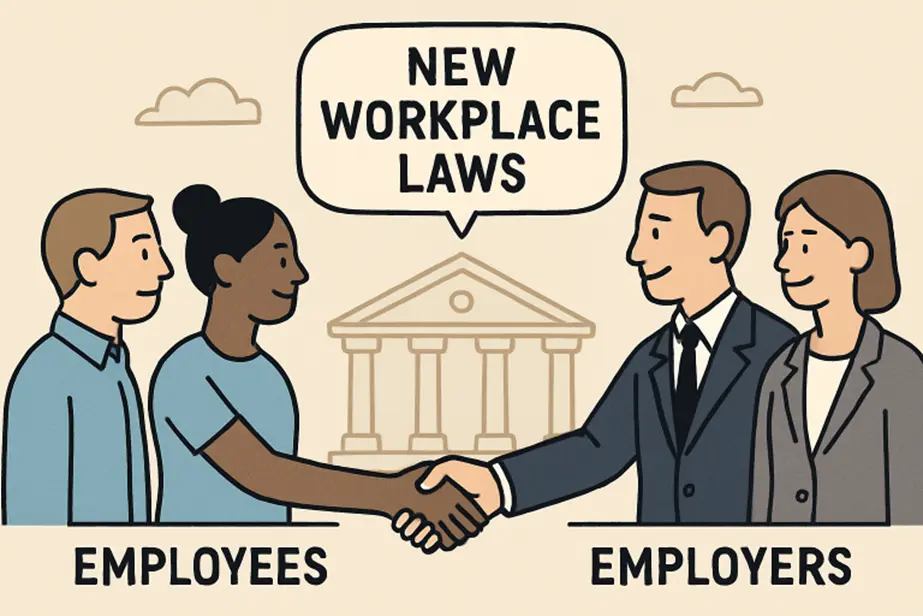How New Laws Are Shaping Employee Rights
Legislative changes are fundamentally altering the landscape of employee rights in the United States, introducing new workplace protections and reshaping employer responsibilities. Connecting with the best employment lawyers in Colorado Springs can be a valuable first step for workers seeking support or legal guidance in this evolving landscape. Staying current on these developments is essential for employers and employees to foster fair, compliant, and healthy workplaces in 2024 and beyond.
Recently, a significant push has been made to address longstanding issues around workplace equity, health accommodations, and technology-driven discrimination. New laws now directly impact everything from protections for pregnant and disabled workers to the ethical use of artificial intelligence in hiring and job evaluations. Understanding where these changes apply and what they mean practically is crucial.
These legislative reforms are not happening in isolation. Instead, they reflect broader societal demands for equity, respect, and safety at work. Businesses must revise their policy manuals and training to ensure compliance, while employees gain new grounds to advocate for health, privacy, and transparency in their treatment and evaluation.
To better understand current trends and compliance standards, consulting recent coverage from primary labor law resources or exploring state-level labor department updates can provide further clarity and timely advice.
Enhanced Protections for Pregnant Workers
One of the most impactful pieces of federal legislation enacted in recent years is the Pregnant Workers Fairness Act (PWFA), which came into effect in June 2023. This law mandates that employers offer “reasonable accommodations” for pregnancy-related conditions, including medical appointments, rest periods, and adjustments for morning sickness. Previously, many women—especially those in physically demanding or lower-wage positions—faced hardship or even risked job loss when seeking workplace accommodations for pregnancy or related conditions.
This act is a step forward in closing gaps that left pregnant employees vulnerable, aligning with similar reforms in other countries. For additional guidance on workplace accommodations, the U.S. Equal Employment Opportunity Commission offers comprehensive updates and compliance checklists.
Addressing Discrimination from Wearable Technology
As wearable devices—such as fitness trackers, smartwatches, and augmented reality headsets—become more common in workplaces, the EEOC has raised concerns about privacy, consent, and potential discrimination. Employers who mandate the use of wearables for productivity monitoring, safety, or health assessments may inadvertently collect sensitive biometric information. According to federal guidance, tracking such data could constitute a “medical examination,” bringing it under the protections of the Americans with Disabilities Act (ADA) and raising questions about discrimination based on disability, pregnancy, sex, race, or other protected categories.
Employers are advised to tread cautiously, ensuring workers are informed and protected from bias or wrongful termination based on health metrics or data gathered from these devices. The EEOC warns employers about wearable tech risks and potential workplace discrimination.
Regulating AI in Employment Decisions
Artificial intelligence and automated decision-making systems rapidly transform hiring, promotions, and employee evaluations. Recognizing the risks of algorithmic bias and opaque decision-making, California has introduced the “No Robo Bosses Act.” This proposed legislation would require employers to notify workers whenever an AI or automated system is making critical employment decisions—such as discipline, demotion, or dismissal—and provide meaningful human oversight. The law aims to increase transparency, prevent discrimination, and ensure workers have recourse if computer-driven processes unfairly treat them.
Other states are watching closely, while industry leaders anticipate federal guidelines on AI implementation in human resources. As AI shapes workplaces, employees and companies must be vigilant to prevent automated systems from introducing new inequities or reinforcing old biases. For a broader sector view of AI regulation, see Reuters’ analysis of AI’s impact on workforce rules.
State Initiatives to Strengthen Worker Rights
Individual states are also enacting ambitious new laws to buttress worker rights. For instance, New Jersey recently passed legislation to expand access to labor rights education, ensuring that employees and public sector workers know their rights and are protected from coercive or retaliatory employer practices. Likewise, New York has added new laws safeguarding public sector employee benefits and ensuring greater job security, responding to widespread calls for worker support during the COVID-19 pandemic and ongoing economic uncertainties.
These local initiatives blueprint how other states approach workplace rights reform, bridging federal protections and regional priorities. For a policy summary, refer to NBC News’ recent coverage of state-level worker rights laws.
Implications for Employers and Employees
For employers, these changes necessitate significant adjustments in HR policies, staff training, and workplace management technology. Companies must audit existing practices and ensure full compliance with federal and state legislation, with a renewed commitment to fairness, inclusivity, and employee well-being. Failure to do so can result in legal liabilities, reputational harm, and loss of talent.
Increased legal protections for employees create new opportunities to seek reasonable accommodations or protections from discrimination. Workers are encouraged to proactively educate themselves about their rights, seek legal advice when facing challenges, and collaborate with HR departments to foster transparent, constructive conversations about workplace needs.
Conclusion
The legal landscape governing employee rights continues to evolve as society places greater emphasis on fairness, transparency, and workplace equity. New regulations addressing wage standards, discrimination, privacy, and remote work practices are being introduced regularly, reshaping how organizations operate. For businesses, maintaining compliance requires proactive policy reviews, regular training, and collaboration with legal or HR experts to ensure that workplace standards meet current legal expectations. Employees, meanwhile, must also stay informed about their rights and available protections to safeguard their interests. Open and honest communication between employers and employees fosters trust, minimizes disputes, and encourages a culture of mutual accountability. Adaptability and awareness are key to maintaining a lawful, respectful, and inclusive workplace in this dynamic environment.
Also Read-

